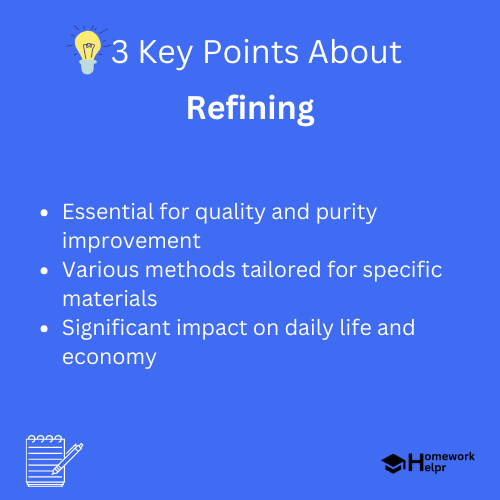📝 Summary
Refining is a crucial process across various industries, including metallurgy, petrochemicals, and food processing. It aims to enhance the quality of raw materials by removing impurities and separating desired components. The significance of refining lies in improving quality, increasing efficiency, protecting the environment, and offering cost-effectiveness. Refining processes vary, from metal smelting to water filtration, each involving steps of separation, purification, and reconstitution. Despite its benefits, challenges like energy consumption and environmental concerns remain. Understanding refining promotes a deeper appreciation of the materials we engage with daily and the imperative of sustainable practices.
Understanding the Process of Refining
Refining is an essential process in various industries, particularly in metallurgy, petrochemicals, and food processing. It involves improving the quality of a raw material by eliminating impurities and separating desired components. In this article, we will explore the different aspects of refining, its significance, and how it plays a crucial role in everyday life.
The Importance of Refining
Refining is vital for several reasons, primarily to ensure the purity and quality of materials we use daily. The process helps in:
- Enhancing Quality: Refining improves the overall quality of products, making them fit for consumption or use.
- Increasing Efficiency: By separating impurities, refining makes materials easier to process and use.
- Environmental Protection: Proper refining processes can help in reducing waste by recycling valuable materials.
- Cost-Effectiveness: High-quality refined materials can be produced at a lower cost in the long-run and reduce energy consumption.
These benefits show that refining is not just a technical process but one that deeply impacts our environment and economy.
Various Types of Refining Processes
There are various methods of refining depending on the type of raw material being processed. Different sectors employ different techniques. Here are some common refining processes:
- Metal Refining: This includes processes like smelting and electrolysis that are used to purify ores and recover metals.
- Oil Refining: It involves distillation and various chemical processes to transform crude oil into usable petroleum products.
- Sugar Refining: Raw sugar is processed to remove molasses and impurities, resulting in white sugar.
- Water Refining: It includes filtration methods and chemical treatment to make water potable and safe for consumption.
Understanding these different processes can help students appreciate how materials transform from their raw states to usable forms.
The Refining Process Explained
The refining process varies significantly between industries, but generally, it follows three main steps:
- Separation: This step involves separating impurities from the desired material. For example, in metal refining, the ore is crushed and chemically processed to remove unwanted substances.
- Purification: After separation, the results are purified; this could involve chemical treatments, heating, or even filtration. For instance, in sugar refining, the raw sugar is dissolved and filtered to eliminate molasses.
- Reconstitution: The final stage involves reshaping or reconstituting the refined material into a usable form. In metal refining, this might be casting, while in oil refining, it could involve blending different fractions to create gasoline.
Each of these steps has specific techniques and methods associated with them, ensuring that the refined product meets industry standards.
The Role of Refining in Everyday Life
Refining affects various aspects of our lives in ways we might not immediately realize. The materials we use, the food we consume, and even the fuel that powers our vehicles undergo refining processes. For example:
- Without oil refining, we wouldn’t have gasoline for our cars, which is vital for transportation.
- Sugar refining processes allow us to enjoy the sweet taste of desserts and beverages.
- Metal refining ensures that we have high-quality materials for construction, electronics, and transportation.
This demonstrates the significant interconnectivity of refining with our day-to-day activities.
❓Did You Know?
Did you know that the first known metal refinement was done with gold around 4000 B.C.? This highlights the long history of refining in human civilization!
Challenges in Refining Processes
While refining provides numerous benefits, there are also challenges associated with it. Some of the key issues include:
- Energy Consumption: Many refining processes are energy-intensive, leading to increased production costs.
- Environmental Concerns: Some methods can generate significant waste or emissions, making it crucial to adopt greener practices.
- Quality Control: Ensuring the consistency and quality of the refined product can sometimes be challenging due to variations in raw materials.
Addressing these challenges requires innovation and sustainable practices in refining operations, which motivate ongoing research in the field.
Conclusion
Refining plays an essential role in enhancing the quality of various materials used in our daily lives. By separating impurities and improving the characteristics of raw substances, refining not only contributes to economic efficiency but also underlines the interconnected nature of modern industries. Understanding the refining process gives us insight into significant advances in technology and industry, along with the importance of sustainability.
As students and future innovators, having knowledge about refining can inspire you to think critically about production processes and the sustainability of our resources. Remember, every small improvement in how we refine materials can lead to a big impact in our lives and the environment!

Definition
Electrolysis: A chemical process that uses electricity to break down compounds into their elemental parts.
Smelting: The process of extracting metals from their ores by applying heat.
Filtration: A procedure used to separate solids from liquids or gases using a filter.
Examples
1. To refine silver from ore, miners crush and heat the silver ore with chemicals such as cyanide, allowing it to be extracted more efficiently. 2. In water treatment, refining involves passing water through various filters to remove bacteria and other impurities, creating safe drinking water.
Related Questions on Refining
What is refining?
Answer: Refining is improving raw material quality by removing impurities.
Why is refining important?
Answer: Refining ensures material purity, environmental protection, and cost-effectiveness.
What are common refining methods?
Answer: Common methods include metal refining, oil refining, and sugar refining.
What challenges does refining face?
Answer: Challenges include energy consumption, environmental concerns, and quality control.
